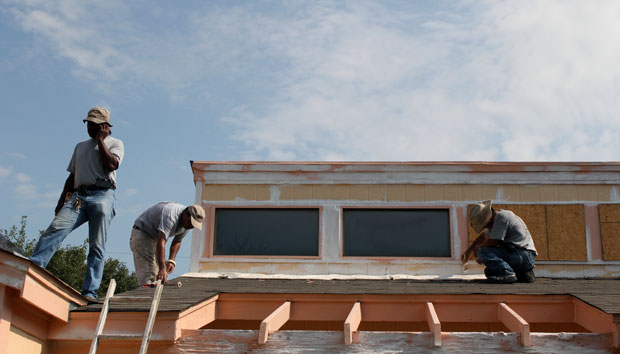
Caption
Joe Wertz / StateImpact Oklahoma


Caption
Joe Wertz / StateImpact Oklahoma

Joe Wertz / StateImpact Oklahoma
Lonnie Hunt takes a break on a job site to place an employment ad for two additional workers. Hunt, an ex-felon who received construction training in prison, often hires other ex-offenders to help give their careers a start.
Hiring former inmates isn’t a priority, or an option, for many Oklahoma business owners. But Lonnie Hunt says felons are often better workers than those who’ve never been behind bars.
Hunt should know — He’s been to prison. And now he does the hiring.
The male unemployment rate is inflated by more than a full percentage point because the country’s convicted felons have such a hard time finding work, according to a 2010 report from the Center for Economic Research and Policy Research.
Finding a job — especially a good job — helps reduce recidivism, corrections officials and criminologists say. Ex-offenders who are employed have better odds never returning to prisons, which saves Oklahoma taxpayers about $20,000 per inmate each year.

Joe Wertz / StateImpact Oklahoma
Lonnie Hunt directs workers and takes calls from the roof of an Oklahoma City home that suffered roof damage from a recent hailstorm.
Home repairs are still underway in northwest Oklahoma City following last year’s major hailstorm. Along Westchester Avenue, work crews strip damaged shingles from roofs and nail new ones down in their place.

Joe Wertz / StateImpact Oklahoma
A painter touches up trim on an Oklahoma City home damaged in a hailstorm.
“Business is good, business is good,” says Hunt, owner of Guaranteed Construction, which employs more than a dozen workers.
Hunt worked in construction trades most of his life, and his sun-weathered features serve as proof. He received a plumbing certification from a CareerTech Skills Center while he served time at the Joseph Harp Correctional Center in Lexington.
“I had a robbery charge, so, at that time I was incarcerated about four years,” he says.
A local plumbing company gave Hunt a second chance when he was released from prison. In 2008, Hunt started his own business and started trying to repay the kindness. At Guaranteed Construction, felons are welcome — as long as they’re hard-workers.
“The same thing applies with these other guys,” Hunt says. “When they get out, they have a problem finding jobs because of them being ex-offenders. So, we’re just, you know, passing it on.”

Joe Wertz / StateImpact Oklahoma
Breon Bellamy went to prison for robbery when he was 18. He was trained as an electrician behind bars, and now has a job working for Guaranteed Construction in Oklahoma City.
Most of Hunt’s employees aren’t felons, but their appreciation for the job often means they’re more dedicated workers.
“They know that, for one, they have all of these strikes against them when they get out,” Hunt says. “So when they finally get a job, they certainly want to hold on to it. Because they know it’s so hard to get in the first place.”
When Breon Bellamy arrives on the job site, Hunt gives the apprentice electrician his marching orders.
Bellamy started started serving time for a robbery when he was just 18. He had no job skills when he went in. But he says he’s a totally different person now. He received training at a prison Skills Center, too, and now he has a job — his first one, if you discount an early career selling drugs.
“I knew when I got out here I couldn’t act the way I acted the way I did in the penitentiary, or the way I acted before I got to the penitentiary, because I knew it wasn’t right,” Bellamy said.
Bellamy has been on the job site for a few minutes and hasn’t even started working, but beads of sweat are already forming on his face.
But he’s not complaining.
“When you go to penitentiary and sit in them hot cells, and you don’t get no money, you don’t have no problem coming out here working in the sun,” Bellamy says. “When I was in the penitentiary, every summer, they don’t have air conditioning, so we’d be in there sweating. So now I don’t got no problems being out here in the heat. At least I get paid for being out here sweating.”